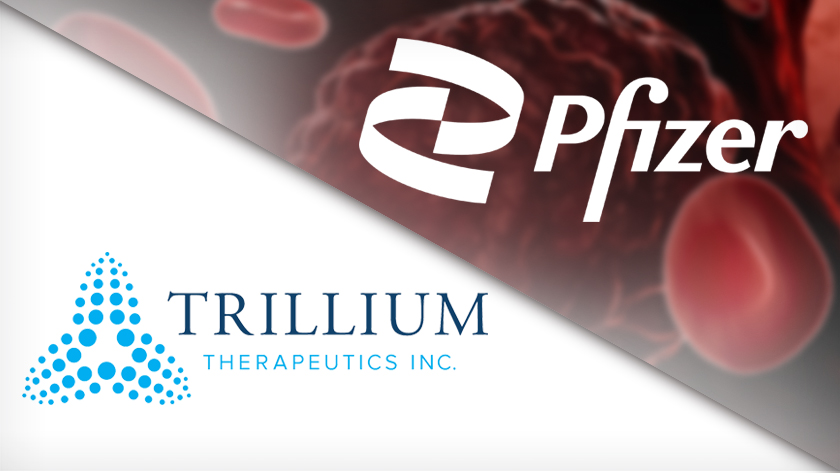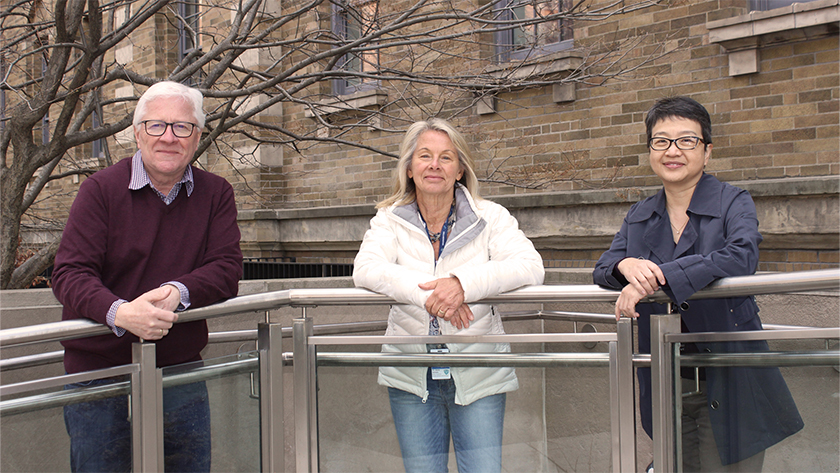
Fundamental discoveries into how cancer evades detection by the immune system—and new tools to curb this—have spurred Pfizer’s acquisition of Trillium Therapeutics in a $2.22 billion USD deal.
The ground-breaking research was conducted at UHN and SickKids and was led by Princess Margaret Cancer Centre (PM) Senior Scientist Dr. John Dick, PM Clinician Scientist Dr. Jean Wang and SickKids Senior Scientist Dr. Jayne Danska.
Through a long and productive collaboration, these researchers discovered how to manipulate the “don’t eat me” signal, a signal that cancer cells use to evade the immune system and dodge destruction. This critical signal stems from interactions between two proteins: the CD47 protein—found on the surface of cells—and the SIRPα receptor. CD47 exists at low levels on healthy cells, but at much higher levels on cancer cells. The high levels of CD47 on cancer cells bind to the SIRPα receptor on specialized white blood cells that would normally kill cancer cells, inhibiting their activity.
Blocking the interaction between CD47 and its receptor has been shown to promote the targeting of cancer by the immune system, suggesting that the receptor is a potential anticancer target.
The team observed that blocking SIRPα activity in experimental models of leukemia promoted the clearance of leukemia stem cells, a sub-population of cancer cells that are resistant to standard chemotherapy and which drive cancer growth. This discovery was published in the Journal of Experimental Medicine and led to the development of TTI-621, a protein that blocks SIRPα signaling and boosts the immune system’s ability to combat cancer.
“Our molecule unblinds the immune system so it can attack the aberrant cancer cells and destroy them,” says Dr. Wang. “Normal cells are much less reliant on this signaling axis because they don't have the abnormal characteristics of cancer cells. So when you interrupt that “Don’t Eat Me” signal, the immune system tends to see the cancer cells first.”
TTI-621 became a key technology at the Trillium Therapeutics start-up, licensed with support from Commercialization at UHN and Industry Partnerships & Commercialization (IP&C) at SickKids to advance the discovery closer to application.
This research drew the attention of pharmaceutical giant Pfizer, which inked a deal to buy Trillium in 2021. “Over a decade ago, our scientists recognized the potential that targeting this pathway could have in cancer and licensed this compound to UHN spin-off Trillium Therapeutics to best steward its development. Today, it’s being pursued actively as a new approach for cancer immunotherapies in clinical trials because of its potential to create new treatment options for cancer patients,” says Brad Wouters, Executive Vice President of Science and Research at UHN.
In its announcement that the acquisition had closed late last year, Pfizer touted TTI-621 as “a key immune checkpoint inhibitor currently in Phase 1b/2 development across several indications, with a focus on hematological malignancies.”
“Pfizer’s decision to buy Trillium Therapeutics is the latest testament to UHN’s commercialization expertise guiding early-stage science to maximum societal impact and is proof of the world-class science that powers our ecosystem here in Toronto,” says Mark Taylor, Director of Commercialization at UHN.
For more information about the Pfizer-Trillium deal and the research behind it, click here.
Dr. John Dick (left) is a Senior Scientist at UHN’s Princess Margaret Cancer Centre and McEwen Stem Cell Institute, and a Professor of Molecular Genetics at the University of Toronto. He is also the Co-Leader, Acute Leukemia, Translational Research Initiative, Ontario Institute for Cancer Research. He holds a Tier 1 Canada Research Chair in Stem Cell Biology. Dr. Jean Wang (centre) is a Clinician Scientist and Staff Hematologist at the Princess Margaret Cancer Centre and an Associate Professor in the Department of Medicine at the University of Toronto. Dr. Jayne Danska (right) is a Senior Scientist in the Genetics & Genome Biology program and Associate Chief of the Faculty Development and Diversity at SickKids Research Institute and a Professor in the Departments of Immunology and Medical Biophysics at the University of Toronto.

A cancer research discovery made by Drs. John Dick (L) and Jean Wang (R) at University Health Network (UHN) and Dr. Jayne Danska (centre) at the Hospital for Sick Children (SickKids) has spurred a major pharma deal between Pfizer and Trillium Therapeutics.




